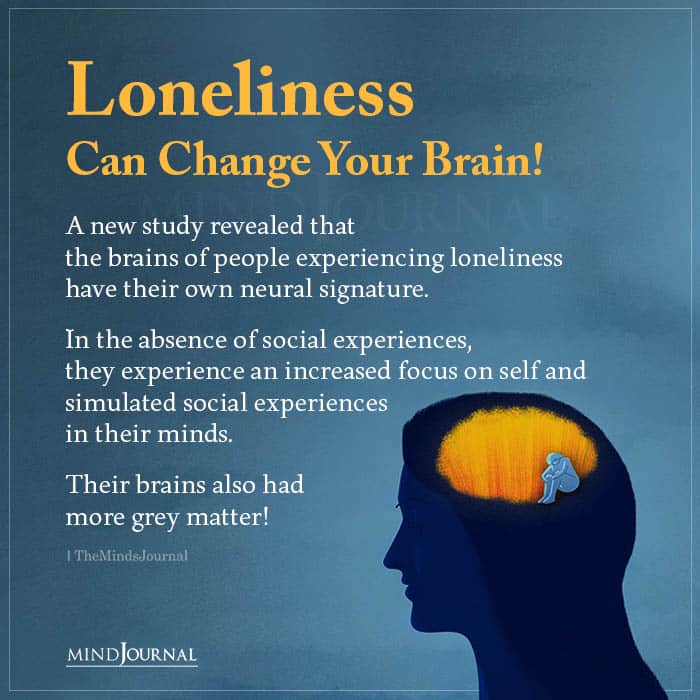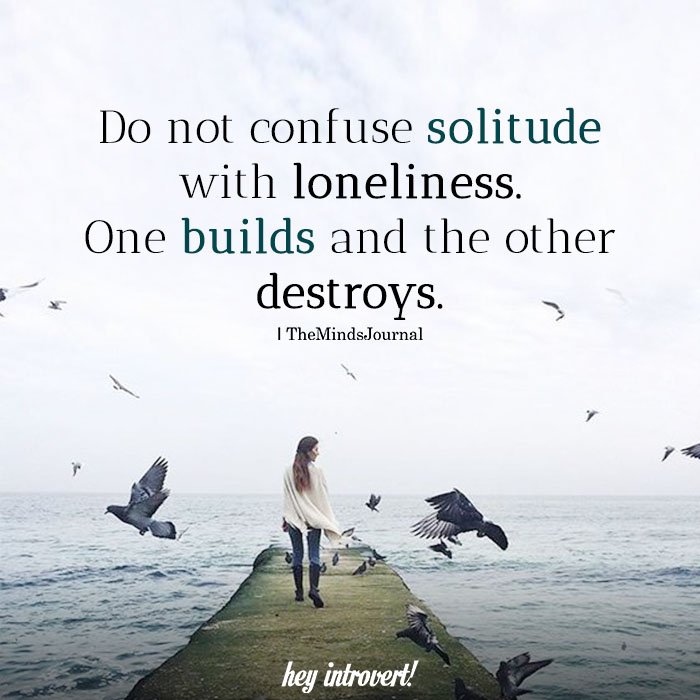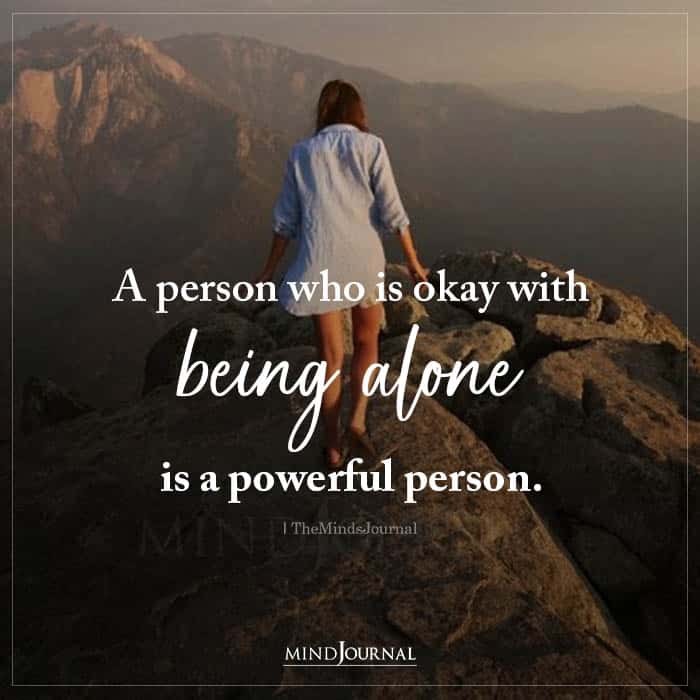Loneliness is a natural feeling that almost all of us experience from time to time. However, there are ways to overcome loneliness, enjoy solitude and be happy alone.
Loneliness: A hidden killer
Did you know that more than three in five Americans are lonely? According to a 2020 survey, over 61% of adults in the US reported feeling lonely, lacking companionship, being left out & poorly understood. What’s even more alarming is that there has been almost a 13% rise in loneliness since 2018. But why are we so lonely? We are more “connected” now more than ever, thanks to social media and instant messaging apps. We can call, text or video chat with anyone across the globe at any time we want. Then why do we feel lonely even when we are surrounded by people, whether physically or virtually? The simple answer is although technology may help us connect with others faster, it cannot help us feel “connected” to someone.
Loneliness is a normal yet complex emotion that can be unique for each of us. It is a damaging state of mind that makes us feel disconnected, alone, unwanted and empty. It makes us desperate for human contact but keeps us from reaching out to others by making us socially isolated. But it should be noted that this state of mind or emotion is necessarily not about being alone, but about having the perception that you are isolated and lonely. It is a subjective, unpleasant and negative emotion caused by disconnectedness and a lack of social connections. A 2013 study states that it is a hidden killer, especially for the elderly.
Related: Loneliness: Surprising Ways It Impacts Our Health and Wellbeing

Further studies show that being lonely and isolated can indirectly lead to poor health and well-being by affecting our health-related behaviors. In fact, it is associated with the onset of mental health issues and psychiatric disorders, such as stress, anxiety, depression, substance use and suicidal ideation. Research further reveals that this state of mind is also linked to several other cognitive, behavioral & physiological consequences, such as –
- Increased morbidity & mortality
- Accelerated physiological aging
- Impaired emotional and cognitive functioning & outcomes
- Impaired capacity to self-regulate
- Sleep deprivation
- Cardiovascular disease & stroke
- Increased blood pressure
- Elevated cortisol levels
- Impaired cellular immunity
- Increased risk for Alzheimer’s disease
- Antisocial behavior
- Poor decision-making
- Reduced memory & learning
According to another 2014 study, it can also cause personality disorders, child abuse, lupus, rheumatoid arthritis, diabetes, coronary heart disease, cancer, obesity, hypertension, poor hearing etc. “Loneliness poses a significant health problem for a sizeable part of the population,” explains a 2017 study.
Related: 10 Signs That Show Loneliness Has Taken Over Your Life
Solitude: The savior
While loneliness can be a damaging emotion, the antidote to its consequences lies in our ability to enjoy solitude. Contrary to popular belief, loneliness is not about being alone, but about having a sense of isolation. Solitude, however, refers to a state of being alone, isolated and secluded without feeling lonely, leading to higher levels of self-awareness. It is a psychological phenomenon characterized by a lack of contact with others and is associated with various benefits. Not only can it enable us to enjoy some alone time, it can also help us improve our performance, be more productive, help us reflect, boost our concentration and promote self-development. According to a 2020 study, “solitude is a developmental milestone” that helps us manage our growth across different life stages. It is a positive emotion which we need to learn to manage. Our capacity to cope with this emotion can enable us to overcome anxiety & depression and acquire helpful personality traits. It is also associated with lower negative affect or emotions.

In fact, evidence shows that spending time alone in nature can lead to personal growth, boost sense of self-worth, self-confidence and self-reflection. It also helps us to find the meaning of life, discover new ways of knowing ourselves and others and improve our sense of purpose & personal belonging. While loneliness is burdened by negative emotions and feels like a punishment characterized by deficiency and isolation, solitude is a blessing marked by positive moods, self-awareness and a renewed sense of self. Loneliness may be forced on us, but solitude is what we choose to overcome it. All we need to do is shift our mindset from feeling trapped in isolation to seeing it as an opportunity to explore ourselves. Recent research shows that reframing and reappraising time spent alone as solitude can help to boost resilience, positive mood & overall well-being and reduce negative emotions associated with loneliness.
Related: Loneliness vs. Solitude: It’s About Choice
How to overcome loneliness & enjoy solitude
Solitude empowers our mind, body and soul while loneliness drains them. Solitude represents the joy of being alone, while loneliness refers to the pain of being left alone. Having the ability to enjoy being alone leads to inner peace and richness. This is why it is crucial that we learn to enhance our solitude capacity and defeat feeling lonely to enjoy our own company.
Here are a few ways to start enjoying your alone time while crushing the negative effects of loneliness –
1. Acknowledge that you’re lonely
Accept the fact that loneliness is a normal emotion which all of us experience at some point in our lives. Regardless of how connected you are online or how many people may surround you, you will feel lonely sometimes. But you’re not alone in this. Millions of people worldwide cope with this emotion and its negative effects regularly. They key is to identify when you have this state of mind, accept it as a natural human emotion and intentionally change your attitude and perspective towards being alone.
Instead of engaging in unhealthy coping mechanisms, like drinking or taking drugs, use this time as an opportunity for personal growth. The more you are aware of your feelings of isolation, the better you will be able to deal with its consequences. Be patient and take steps to relieve and replace negative emotions with positive ones.
2. Seek professional help
Loneliness can have serious mental health effects that can affect our ability to function in daily life, damage our relationships and lead to physical health issues. This is why it is a great idea to consult a mental health professional to crush loneliness before it crushes you. Talking to a therapist can help you develop strategies to better manage your thoughts and emotions and heal your pain. Studies have found that psychological and behavioral interventions tend to be highly effective in reducing feelings of being isolated and lonely. Psychotherapy can also “improve the life quality and satisfaction of people suffering from the (real or perceived) absence of social relationships.”
Related: 10 Surprising Facts About Loneliness

3. Practice self-love and self-compassion
Solitude is all about enjoying your own company and that begins with loving yourself. When you practice self-love, you focus your attention on your own needs and engage in activities that make you happy without being dependent on anyone else. It also helps to build your sense of self-worth and self-esteem. However, as we are crippled with negative emotions and negative self-talk when lonely, loving ourselves can be difficult. This is why you need to be kind with yourself. Instead of criticizing, blaming and hating yourself, show yourself some compassion. Be aware of self-destructive thoughts, limit the negative self-talk and simply take a break to do things that you enjoy, like taking a walk, eating your favorite food or getting a massage.
4. Build healthy habits
When you are alone, self-doubt and other unhealthy thoughts can easily creep in pushing you towards a downward spiral. This is why it is essential that you follow an organized routine, establish helpful rituals and develop healthy habits. Build a routine for your typical day – waking up, cooking & eating meals, getting chores done, completing your professional commitments, self-care practices, bedtime routines etc. This will help to better organize your day and help you manage intrusive negative thoughts & emotions.
Related: Why Are Teens So Lonely and 7 Things They Can Do To Combat Loneliness
5. Use your leisure time wisely
How you spend your spare time can determine whether you crumble to feelings of loneliness or enjoy solitude. Scrolling social media endlessly, mindlessly watching Netflix or just tampering with your phone in the name of “relaxing” can increase feelings of isolation. However, if you use your leisure time for self-development or resting your mind, body and soul, then you will truly be able to experience the benefits of alone time. Instead of wasting your time being lazy, read a book, learn a new skill, engage in some creative activity, exercise, cook, listen to music or meditate.
You can also choose to pursue your hobbies and start working on new projects to stay engaged. Not only will this help you defeat feelings of being lonely, it will also be a rewarding experience that gives you the joy and satisfaction of creating something and boost your mood & self-esteem.

6. Engage in self-reflection
Whenever you get some alone time, instead of giving way to your negative thoughts, reflect on your past experiences, your relationships, your life, yourself and your purpose. Solitude is the first step towards inner peace and spiritual enlightenment. One 2002 study explains that spirituality is a life-giving force which is filled with awe and solitude “that inspires one to strive for balance in life.” Further studies have found that self-reflection and solitariness are associated with spiritual enlightenment and that these can reduce feelings of loneliness, social isolation and stress, while helping us to find a sense of meaning in our lives.
Related: 6 Kinds Of Loneliness And Strategies To Deal With It
7. Cultivate existing relationship
Focus on rebuilding your current relationships and reconnecting with your family members and friends. Spend more time with your loved ones by meeting them in person, calling them up over the phone or even video calls, especially if you haven’t spoken in a while. Strengthening existing bonds is a great way to combat loneliness. So make sure to reach out to people you care about. There is no shame in seeking some social support as it is beneficial for your mental & emotional well-being.
8. Volunteer
Volunteering or community service can not only help you meet new people and interact with others, but it can also help you find a new purpose in life. Working with others to give back to your community can decrease loneliness, increase life satisfaction, boost happiness and help you feel grateful for your life. According to a 2018 study, higher intensity volunteering can help to alleviate feelings of social isolation.

Apart from these, here are some helpful ways you can defeat loneliness and embrace solitude –
- Take a break from social media and excessive use of technology
- Make some time for your mind to just be and wander
- Do not compare yourself to others
- Go for a solo vacation or take yourself out on a date
- Get some sun and spend more time in nature
- Practice gratitude and be thankful for what you have
- Develop coping skills and strategies
- Talk openly to someone you trust
- Pursue your interests and hobbies
- Adopt a pet and care for it like a member of your family
- Say “yes” more often when invited to social gatherings
- Practice positive affirmations
- Practice mindfulness and live in the present moment
- Follow a healthy lifestyle – get enough sleep, eat healthy & exercise regularly
- Avoid substances, like alcohol & drugs and stimulants, like nicotine & caffeine
- Invest money on new experiences rather than buying new things
- Join an online support group
- Talk to strangers & make new friends
- Maintain a journal and write down your feelings everyday
Related: Is It Solitude or Loneliness?: 4 Questions to Help You Tell
Loneliness is a disease, solitude is the cure

When you are feeling overwhelmed with being alone for too long, remember that it is a fleeting experience. No one remains lonely forever as long you love yourself and focus on improving yourself. While loneliness focuses on the lack of connection with others, solitude is characterized by a stronger connection with your inner self.
As being lonely can lead to different mental and physical health complications, it is crucial that you remain aware and shift your mindset to take a more positive approach to being alone. Being able to enjoy your own company will make you happier, more satisfied and find new meaning in life. However, it is also important that you socialize often and see a professional to improve your mental health.
Related: Time Alone (Chosen or Not) Can Be A Chance To Hit the Reset Button











Leave a Reply